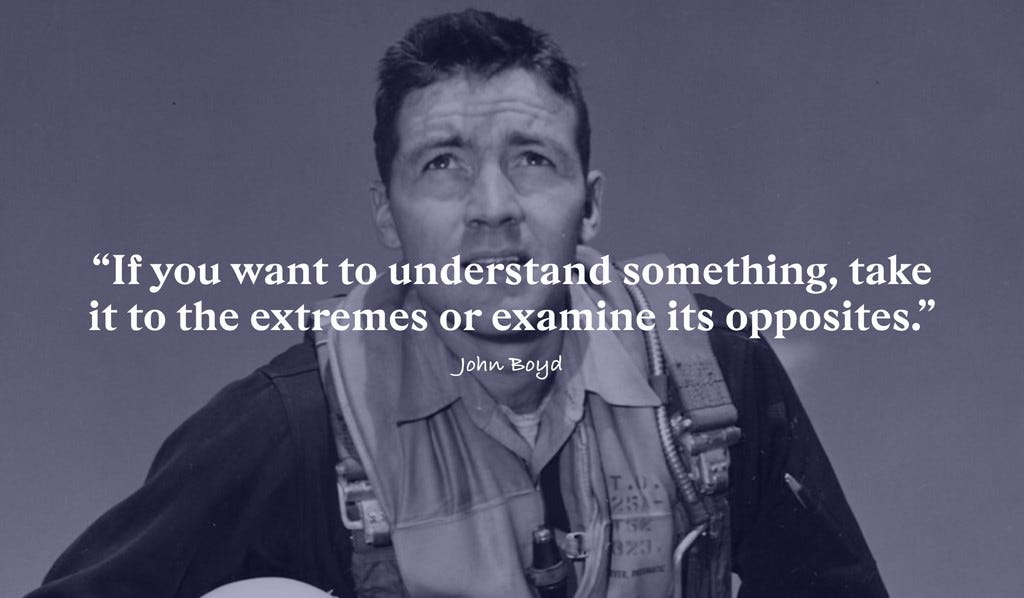About John Boyd
Our name was inspired by Colonel John Boyd, a fighter pilot, military strategist, and innovative thinker whose ideas have influenced a variety of sectors.
Colonel John Boyd (1927–1997) was a visionary military strategist and influential thinker whose contributions to warfare and decision-making have left an indelible mark on military theory and practice. Born in Erie, Pennsylvania, Boyd's early life was marked by his exceptional intellect and tenacious spirit. His military career spanned over two decades, during which he served as a fighter pilot flying the F-86 during the Korean War, as head of the Fighter Weapons School Academic Section at Nellis Air Force Base, Nevada and, after earning a Master’s degree in engineering, in the Pentagon.
Boyd's true impact, however, emerged through his contributions to military theory. In the 1960s he directly collaborated on the development of the energy-maneuverability (E-M) model, which sought to optimize fighter aircraft performance and design. His research and role in developing the E-M model was used in the design and development of the F-15, F-16, F/A-18 and A-10 aircraft.
In the 1970s his comprehensive theory of warfare influenced warfighting doctrine in the U.S. military services and, chiefly, in the Marine Corps. Boyd is widely known for his “Observe-Orient-Decide-Act” (OODA) decision loop, which has greatly influenced both military and business analyses and decision-making. The development of the OODA loop is Boyd's most enduring legacy lies in his development of the OODA loop, as its dynamic decision-making framework transformed the understanding of decision-making in high-pressure situations, leading to its widespread adoption in military and civilian sectors alike.
Colonel Boyd's unorthodox methods often clashed with conventional military bureaucracy, leading him to be known as a maverick by many of his superiors and peers. At the same time, his dedication to intellectual rigor and his commitment to understanding the essence of conflict resulted in influential works such as his large, widely encompassing — often requiring more than five hours to fully present — Patterns of Conflict briefing, a work that he continually updated and refined until his death.
Boyd's legacy continues to reverberate beyond his passing, as his theories on rapid decision-making, maneuverability, and the essence of conflict shape the strategies and tactics of modern military operations, while also inspiring fields as diverse as business, law enforcement, psychology, and software development. Colonel John Boyd's extraordinary intellect, innovative thinking, and unrelenting pursuit of excellence have left an indelible imprint on the art of war and strategic thought.
Why John Boyd Inspires Us
Many things inspired us to name The Boyd Institute after John Boyd. These include his innovative thinking, maverick spirit, and determination to have an impact as well as the “operating system” of human behavior and decision-making that was the subject of so much of his work.
Our mission is not only to honor Boyd’s legacy but to extend it into the future. We seek to use his core principles and insights while making contributions to the discussion, perception, and understanding of critical issues across a wide variety of disciplines. Boyd was a man of his era and we do not hang on his every word. But the moral and intellectual example he set inspires us every day.
Learn more about John Boyd
Here’s where to start. These links are not comprehensive but will set you on the right path.
Books
Boyd: The Fighter Pilot Who Changed the Art of War, by Robert Coram
Science, Strategy, and War: The Strategic Thinking of John Boyd, by Frans P.B. Osinga
A New Conception of War: John Boyd, the U.S. Marines, and Maneuver Warfare (pdf), by Ian T. Brown
Archives of John Boyd’s work
John Boyd’s personal papers are stored at the Marine Corps University archives division
This Col John Boyd website includes many valuable links
“A Discourse on Winning & Losing” is a collection of Boyd’s presentations and writings. Here is the pdf.


